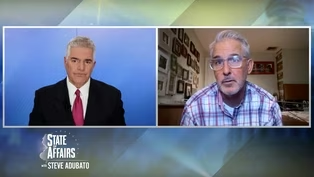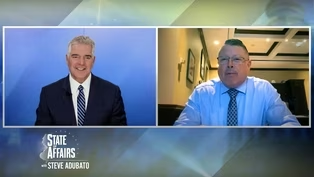State of Affairs with Steve Adubato
Hackensack Meridian Health Foundation's patient care plan
Clip: Season 9 Episode 10 | 9m 12sVideo has Closed Captions
Hackensack Meridian Health Foundation's patient care plan
Joyce P. Hendricks, President and Chief Development Officer of Hackensack Meridian Health Foundation, joins Steve Adubato to examine the foundation's commitment to patient care, research, and education.
Problems playing video? | Closed Captioning Feedback
Problems playing video? | Closed Captioning Feedback
State of Affairs with Steve Adubato is a local public television program presented by NJ PBS
State of Affairs with Steve Adubato
Hackensack Meridian Health Foundation's patient care plan
Clip: Season 9 Episode 10 | 9m 12sVideo has Closed Captions
Joyce P. Hendricks, President and Chief Development Officer of Hackensack Meridian Health Foundation, joins Steve Adubato to examine the foundation's commitment to patient care, research, and education.
Problems playing video? | Closed Captioning Feedback
How to Watch State of Affairs with Steve Adubato
State of Affairs with Steve Adubato is available to stream on pbs.org and the free PBS App, available on iPhone, Apple TV, Android TV, Android smartphones, Amazon Fire TV, Amazon Fire Tablet, Roku, Samsung Smart TV, and Vizio.
Providing Support for PBS.org
Learn Moreabout PBS online sponsorship[INSPRATIONAL MUSIC STING] - We're now joined by Joyce Hendricks, who's President and Chief Development Officer at Hackensack Meridian Health Foundation.
HMH is an underwriter of our health-related programming.
Joyce, it's great to have you with us.
- Thank you, Steve, great to be with you today.
- Describe the role of the foundation.
- So the Hackensack Meridian Health Foundation raises funds, right, for the organization.
And if you really think about it in healthcare, right, the way it is today is that healthcare margins are shrinking, they're thinning, and as you know, Bob Garrett is a visionary and he wants to accomplish a lot.
- The CEO of HMH?
- Yes, absolutely.
My boss, he's got incredible, forward-thinking ideas.
And so if you wanna have the best clinicians, the best docs, right, the best facilities, the best equipment to take care of people in your communities, what's in our margins or what we're getting in income doesn't equate.
We have to raise more money.
It's always been really important to raise money in healthcare.
And if you think about universities as a kind of as an example, universities have been always raising money because they knew that tuition wasn't going to carry the day.
And in healthcare, it's getting to be much the same way.
So we have to get out there and actually raise money if we want to accomplish those things to serve our communities.
- Let me ask you this.
One of the things that we're engaged in is I'm trying to understand the nursing shortage, the physician shortage.
What is the role of the foundation?
What is the role of philanthropy in healthcare, as it relates to the physician/nursing shortage?
Please, Joyce.
- Really good question, Steve.
And people may know or may not know, we started a new school of medicine, Hackensack Meridian School of Medicine, based in Nutley, New Jersey.
And so we're now adding 165 graduates each year, physician graduates each year, to fill that physician shortage, to help fill that.
So that's one way that we're helping to get that done.
Also, we're working towards, in the nursing profession, keeping our nurses and ensuring that they have a future, and we're providing them with scholarships for education so that they can climb the ladder in nursing.
So, all of this helps to solve those shortage problems, if you will.
- It's so interesting that historically, before there would be a philanthropic arm of a hospital or a hospital system.
What happened there?
Like, who did what?
Or was it just if you don't have the money within the healthcare system or an individual hospital, well, then, you lose those nurses, you lose those doctors, they burn out, they're gone.
Our pipeline of physician and nurses, not enough.
What are you gonna do?
- Exactly.
- So, it sounds like philanthropy or foundations are not a luxury, but a necessity.
- Absolutely, Steve.
I think at one time, it may have been considered a luxury.
It was a nice-to-have, but not any longer.
And Bob Garrett saw this about five years ago.
He saw it all coming, and that's why he's been such a visionary CEO for us, and this is why he's prioritized the HMH Foundation and works with us every day to get that job done.
- One of the initiative of Be the Difference campaign.
I actually saw Peter Cancro who, the founder of Jersey Mike's, and Eli Manning, the great Eli Manning, two Super Bowls with the football Giants.
They are co-chair...
They're co-chairs of Be the Difference campaign.
- Yes, yes they are.
- And what are those dollars for?
- The dollars for the Be the Difference campaign go into four buckets, and I'll give you some examples in a second.
- Please.
- But they go into patient care, education, research, and access to care, health equity, that kind of thing, to make sure that people have access.
So, and within those areas, some examples are Jersey Shore.
We can't keep up with the needs at Jersey Shore.
It's the fastest-growing community, fastest-growing hospital, we have to expand.
We need to raise money for that hospital, for expansion, right?
We can't do it- - Jersey Shore is one of the HMH hospitals.
- Absolutely.
- And growing because the population's growing, Joyce?
- Yes, the population's growing, and a good deal of that came from COVID as people moved out of New York and to the shore areas.
So, the population there has grown a lot.
- So let me ask you this.
Eli Manning, I remember...
I remember Eli Manning, and for those of you who follow this, you don't have to be a sports fan.
He's very involved in Tackle Kids Cancer, which is another initiative at HMH having to do with children dealing with cancer.
Why has Eli Manning become so committed to this cause?
- Really interesting.
Eli has really thrived in this space working with us.
And I think Tackle Kids Cancer is what got him started with us.
It was absolutely related to the Giants and so forth, but him teaming up with Peter Cancro has been something amazing to watch.
Peter Cancro as this amazing philanthropist and Eli Manning alongside of him, kind of a much younger figure, but learning through Peter how to be an incredible philanthropist as well.
And both of these co-chairs actually go out and talk with people with us, and explain why they give and why this campaign is important to us.
It's amazing.
- Joyce, as healthcare funding, you are not a public policy expert, but you don't need to be.
You know state funding, federal funding of healthcare, of hospitals.
The whole question about Medicaid, Medicare, we don't know where it's gonna be going.
Does that put even more pressure on philanthropy?
- 100%.
And here's an example of that.
- Sure.
- We are raising money for research, but the NIH is saying your- - National Institutes of Health.
- Yes.
Is saying that your overhead costs that you negotiated, maybe 50%, making up the number, but it may be 50%.
But you're only gonna get 15 now.
So that is money that was budgeted for research purposes that has to be made up.
And the research team is looking to the foundation and say, "Can you help us?
Can you help us raise money for research because we need to plug that budget gap?"
- Research that impacts people's lives.
Right, Joyce?
- Absolutely, absolutely.
I mean, the cancer research that's going on at the Center for Discovery and Innovation, the diabetes research that's going on at the Center for Discovery and Innovation, and there's so much more we can do and are doing.
But those are just two examples, yeah.
- Joyce, one more quick one, medical education.
Is the medical education issue or the pipeline being addressed through the medical school and the support of the foundation to the medical school directly?
I wanna make sure I made that clear.
- Absolutely, so when we get money for, let's say, scholarships for medical students, right?
- Right.
- Medical schools don't make money, okay?
There's no money to be made there.
So, we need to support that school in totality, and that's why that's also increasingly important to raise funds for them.
- And the physician shortage is very real and so that pipeline becomes more important.
Joyce, thank you so much for joining us, we appreciate it.
- Thank you so much, Steve, really appreciate you.
- You got it.
Stay with us, we'll be right back.
- [Narrator] State of Affairs with Steve Adubato is a production of the Caucus Educational Corporation.
Funding has been provided by Delta Dental of New Jersey.
EJI, Excellence in Medicine Awards.
A New Jersey health foundation program.
Congress Hall.
A Cape Resorts property.
Lincoln Tech.
New Jersey Sharing Network.
The Port Authority of New York and New Jersey.
Valley Bank.
PSEG Foundation.
And by The Adler Aphasia Center.
Promotional support provided by ROI-NJ.
And by The New Jersey Business & Industry Association.
- The EJI Excellence in Medicine Awards was established in 1939, shining a light on New Jersey's health care leaders.
Current awards include the Excellence in Medicine, Research, Medical, Education and Community Service.
EJI also funds annual scholarships to medical, dental, pharmaceutical and physician assistant students throughout the state.
Learn more at EJIAwards.org.
Building new, affordable housing for at-risk veterans in NJ
Video has Closed Captions
Clip: S9 Ep10 | 8m 6s | Building new, affordable housing for at-risk veterans in NJ (8m 6s)
How apprenticeships are shaping the next generation
Video has Closed Captions
Clip: S9 Ep10 | 9m 20s | How apprenticeships are shaping the next generation (9m 20s)
Providing Support for PBS.org
Learn Moreabout PBS online sponsorship
- News and Public Affairs

Top journalists deliver compelling original analysis of the hour's headlines.

- News and Public Affairs

FRONTLINE is investigative journalism that questions, explains and changes our world.












Support for PBS provided by:
State of Affairs with Steve Adubato is a local public television program presented by NJ PBS

